Subscribe
“Israeli Air Force struck a Hamas terrorist base inside a hospital in Gaza. A multiple number of terrorists are dead,” Hananya Naftali tweeted soon after an explosion at a hospital in Gaza killed hundreds of people, according to the Gaza Health Ministry and U.S. intelligence. Naftali is a social media influencer who was once an advisor to Israeli Prime Minister Benjamin Netanyahu, and claims that he has been called to join Netanyahu’s digital “task force” fighting to defend Israel online.
Naftali deleted the tweet, and said he had based the tweet on a Reuters article. But screenshots of it went viral because it was an example of someone claiming to be connected to the Israeli government claiming ownership of the explosion. The cause of the hospital explosion has been one of the most contentious and most debated topics in an already devastating war, and we still do not know exactly what happened.
Just over a week later, it is already very difficult to precisely reconstruct the narrative of official and quasi-official tweets, statements, posts, and theories coming from government and politician accounts about this event alone. Add in the unbearable torrent of junk “OSINT” analysis coming from nominally verified accounts, and we do not just have a misinformation nightmare, we have an archival one, too. Basic information like how widely Naftali’s tweet was shared before it was deleted is gone because archiving basic information from Twitter is now ad-hoc, unreliable, and piecemeal. Doing it the correct way is difficult and prohibitively expensive.
When Elon Musk began requiring people to pay steep fees to access the Twitter API earlier this year, he broke a series of tools used by researchers and archivists that could be used to accurately save tweets with metadata. We are now in a situation where the best way to archive “official” information on Twitter in a rapidly changing war is to take screenshots of deleted tweets, which can be faked and may leave out potentially very important metadata, such as what location and device the tweet was posted from, specific timestamps, and unique tweet identifiers that can be used to find the tweet again later. Screenshotting things is also an incredibly inefficient, manual, and ad-hoc way of preserving anything.
“People can fake screenshots,” Miles McCain, the founder of PolitiTweet, told me. “It’s not a trusted form of archival in any way, unless you have hundreds of people with different versions of the same screenshot. I think having a trusted, reliable archive is incredibly important.”
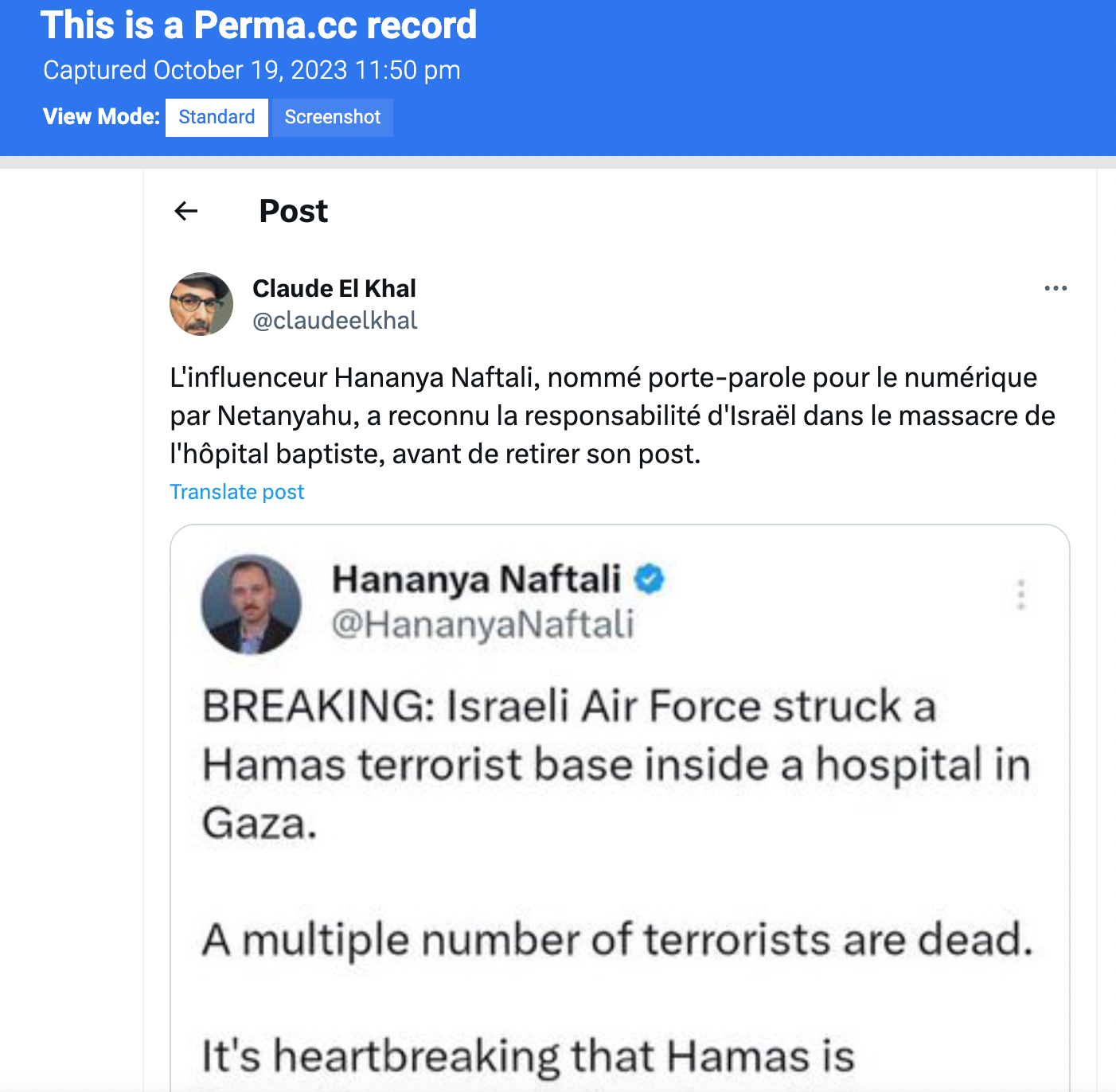
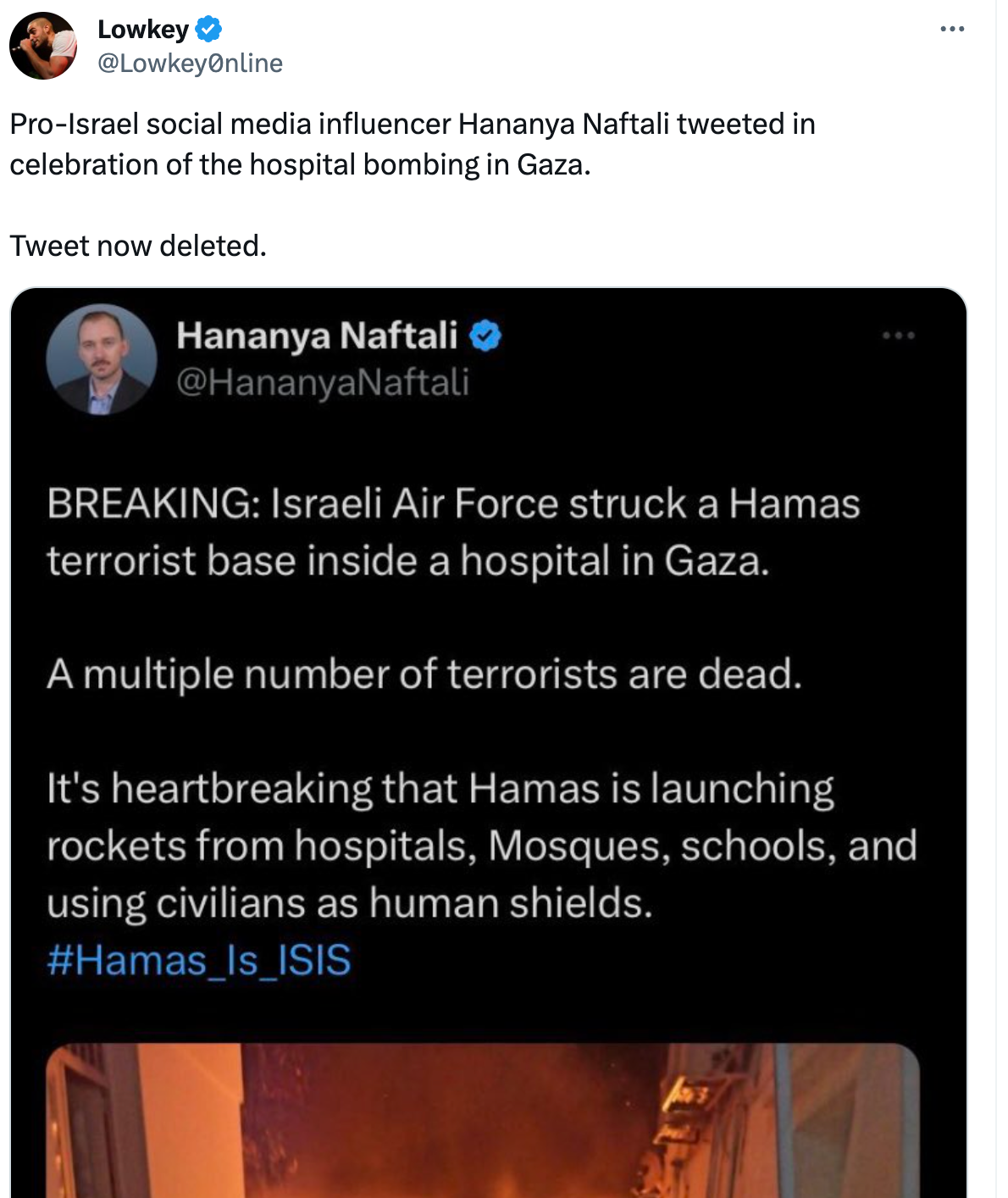
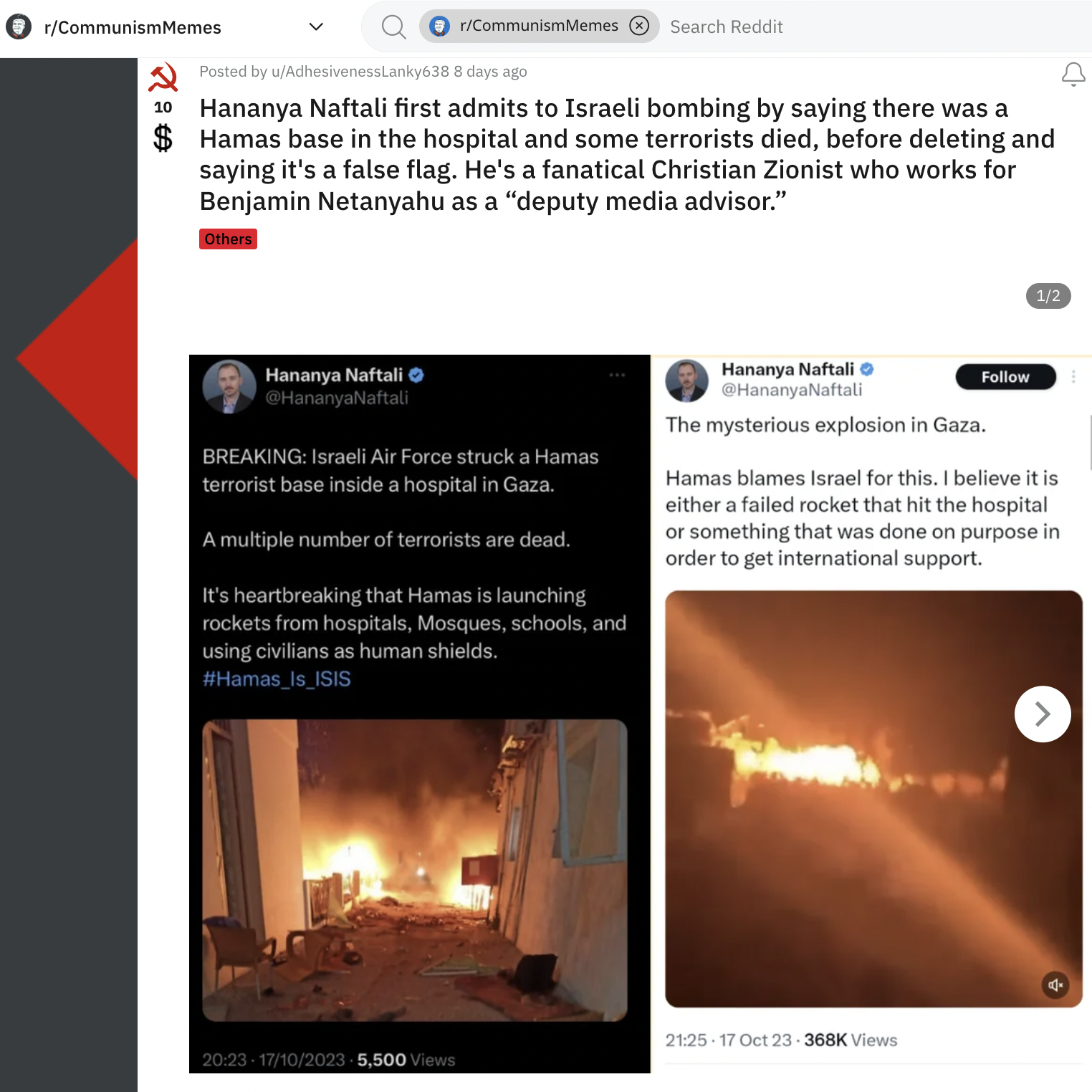
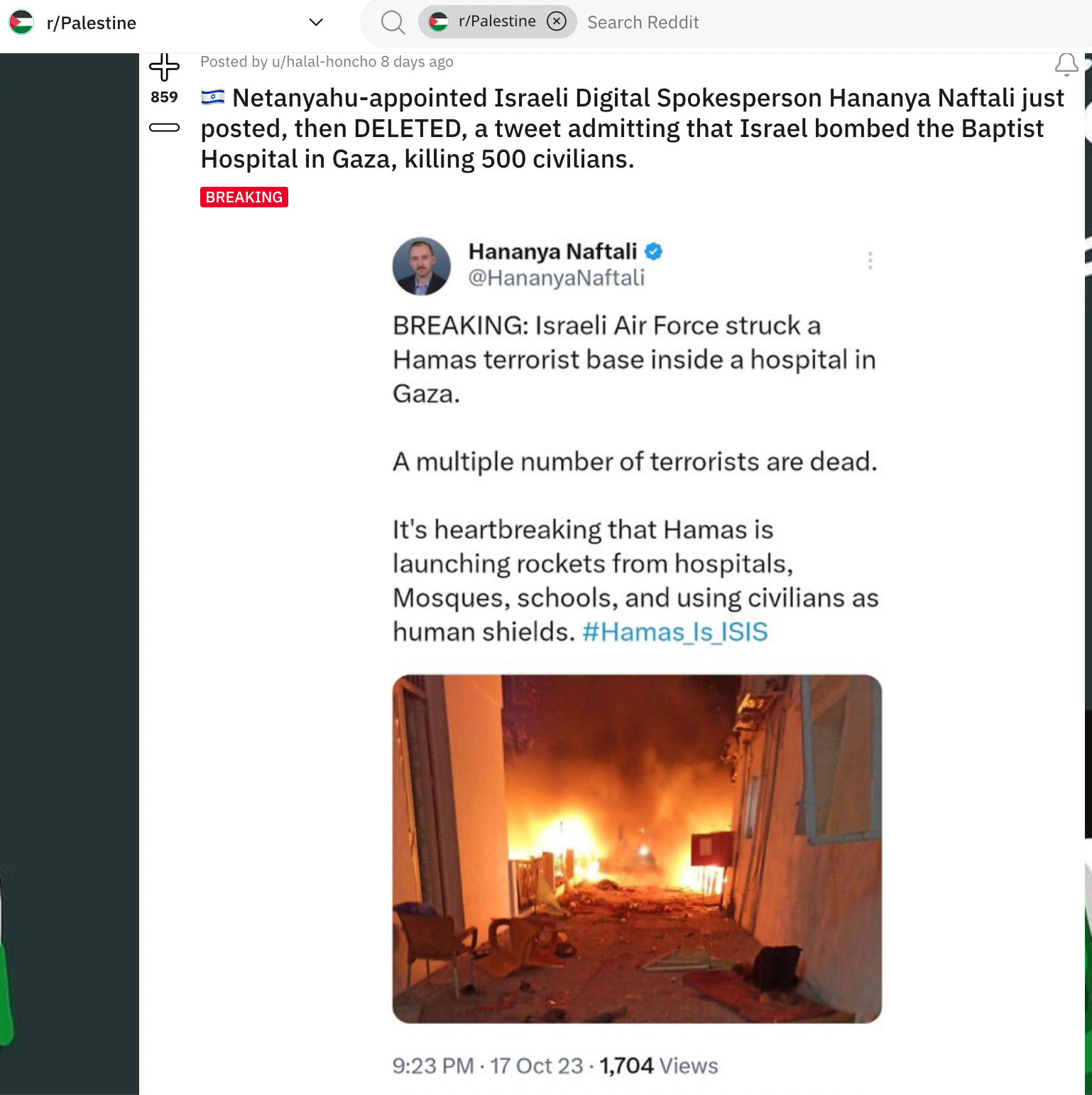
The most complete version of Naftali's tweet, which includes a timestamp, is captured in a screenshot on r/CommunistMemes
For years, PolitiTweet monitored and archived the accounts of 1,536 politicians, public figures, and journalists in an automated way using Twitter’s API. The service archived nearly a million deleted tweets in a systematic, verifiable way. As a random example, in March 2022, Marco Rubio tried a series of various arguments about why his Ukraine aid bill was good and why Democrats’ Ukraine aid bill was bad. He deleted this specific tweet, which he sent from an iPad, after 17 minutes of no likes and no retweets:
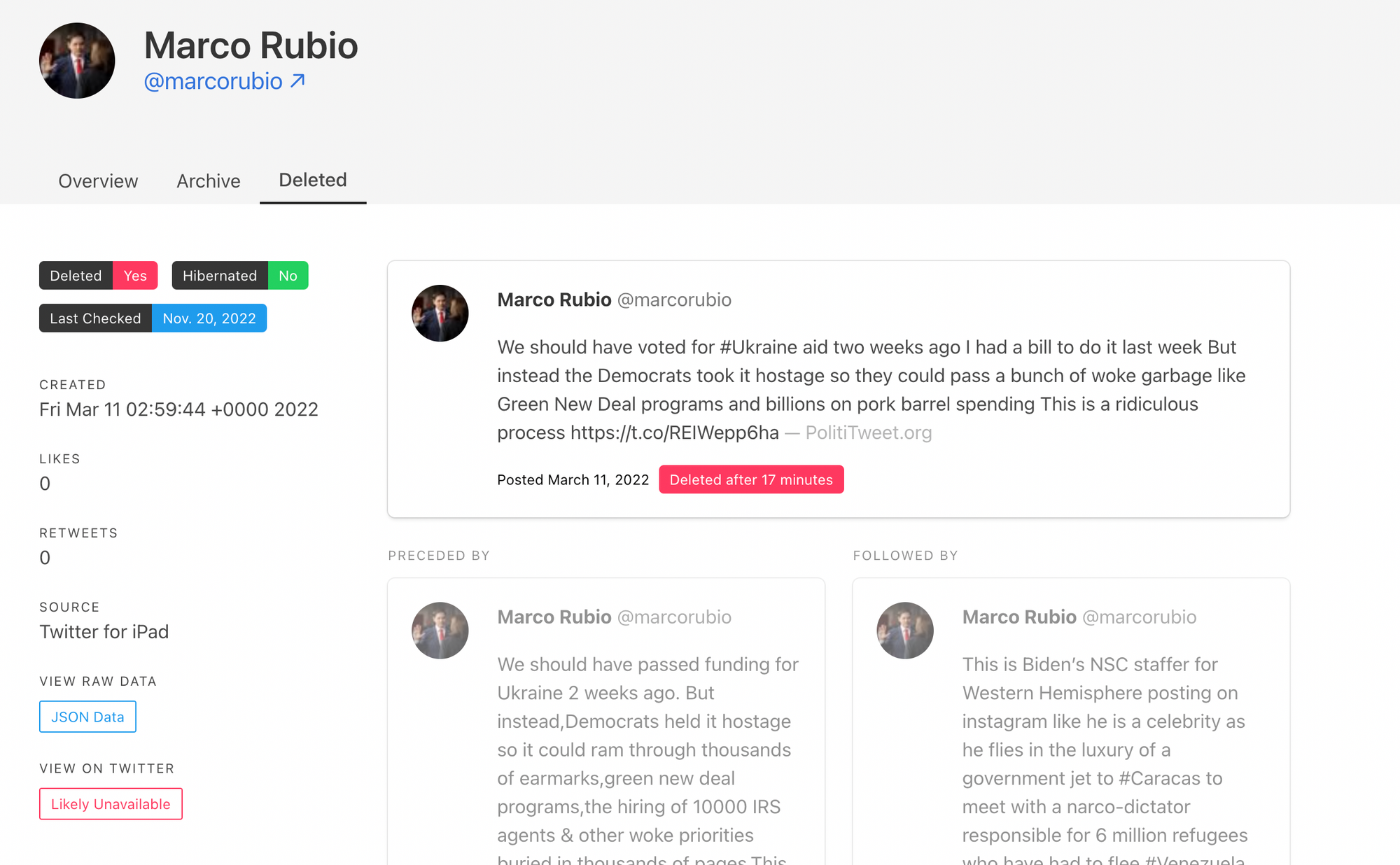
This is good and verifiable. It was pulled directly from the Twitter API before Musk broke it, and the raw JSON data is there. It is possible one hour, one week, one year, and one decade after this tweet to know exactly who made it, when they made it, how they made it, and how it performed on Twitter. Because of Musk’s API changes, it is no longer feasible to do that unless you pay tens of thousands of dollars per month, which many academics, researchers, or archivists simply cannot afford.
“I think that it’s really important for there to be a persistent, trusted archive of who said what and when for public figures, because it’s not always clear at the time what’s going to be significant,” McCain said. “It’s no longer possible to do the kind of archiving we did at scale. It makes this kind of persistent archive a lot harder to make nowadays.”
I’m focusing on Twitter because the vast majority of politicians, public organizations, governments, and government agencies are still using it, though many official communications are now happening on platforms like Telegram, as well. (Telegram, thankfully, is much easier to archive than Twitter as long as a researcher or archivist is actually in the Telegram channel).
Brewster Kahle, the founder of the Internet Archive, warned that this would be a problem in February, after Musk announced his API changes. Tweets and accounts disappearing off of Twitter made clear, he wrote, that “Information that was once readily available to you—that even seemed to belong to you—can disappear in a moment.”
“Losing access to information of private importance is surely concerning, but the situation is more worrying when we consider the role that digital networks play in our world today. Governments make official pronouncements online. Politicians campaign online. Writers and artists find audiences for their work and a place for their voice. Protest movements find traction and fellow travelers,” he wrote, adding that the Library of Congress’s Twitter archiving project was scaled back in 2017 and is seemingly no longer active today. The Library of Congress did not respond to a request for comment.
Hamas-linked accounts are also on Twitter, and some were taken down earlier this month. Twitter did not release any real details about the accounts or what they were doing on Twitter. Other social media platforms, and Twitter before Musk, have provided researchers and the public with data about accounts that were using their platforms for disinformation, violence, and crime. There’s no indication that this happened with these Hamas accounts, so that info too is likely unavailable.
Currently, the AFP’s fact check of Naftali’s tweet is relying on a perma.cc archived backup of a screenshot posted by Lebanese blogger Claude El Khal. There is no timestamp on Naftali’s tweet. Al Jazeera links to a tweet by the podcaster Lowkey, who posted a screenshot of the tweet, also without a timestamp. Politifact quotes the tweet but has no embedded backup to it. None of these accounts or news sources say whether they saw the tweet themselves before it was deleted, took the screenshots themselves, or attempt to explain who took the screenshot. I was able to find two different screenshots on Reddit—one on r/communismmemes and one on r/Palestine—that have tweet timestamps, though not timezones.
I use Naftali’s tweet as an example because, though its contents are contentious, the provenance of the tweet is not. Naftali made it, deleted it, and apologized for making the tweet. People noticed it, and saved it. There are other examples: An Israeli diplomat deleted a tweet suggesting that Ireland funded Hamas’s tunnels. The @IsraeliPM Prime Minister of Israel account deleted a tweet that said “this is the struggle between the children of light and the children of darkness, between humanity and the law of the jungle.” The @Israel account has edited tweets (Twitter, thankfully, has version history on its edit feature). The U.S. Office of Palestinian Affairs deleted a tweet that said “we urge all sides to refrain from violence and retaliatory attacks.”
We saw those tweets because they were made, went viral, and were deleted after much fanfare and controversy. The tweets we’re missing, or that might be stealthily deleted later? Well, they will probably just be lost forever.


